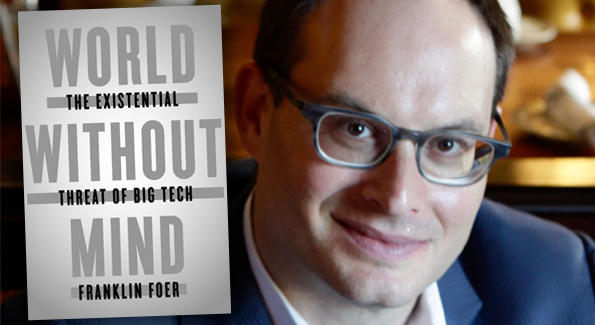Franklin Foer’s “World Without Mind” challenges the power of Silicon Valley.

Google, Amazon, Facebook and Apple — from how we get our news to our shopping habits, these four behemoths have come to dominate our lives. Author Franklin Foer argues in his new book, “World Without Mind: The Existential Threat of Big Tech” (Penguin Press), that this scope of influence has been planned by major tech companies since their inception and that, if left unexamined, humanity will suffer dangerous consequences.
Why do you think people with smartphones and social media accounts need to read this book?
Anybody who has a phone knows the quality of being addicted.
It’s true for me. If my phone is in the other room, it feels like my arm has been cut off.
That addiction is not an accident; it’s designed to be addicting in the same way that a bag of Doritos is designed to be addicting. It has sugar, fat and salt — the mental equivalents of those things. Facebook is a totally powerful example in that it’s a feedback loop. Facebook has taken data and knows everywhere you’ve been, everything you’ve read, everything you’ve bought. They know your habits and they take that information about you and try to arrange your information in the news feed so that you stay engaged for as long as possible, but by engaged what they really mean is addiction where you can’t help but keep checking all day long.
Are we becoming more dependent on our devices? Is it getting worse?
Without a doubt. Facebook measures the amount of time that people spend on it.
It keeps ticking up and now 55 minutes a day is what the average user spends on Facebook, which is a lot of time for one app or one website.
Is there anything that you discovered when writing the book that you didn’t know before?
What I did a lot of was watch YouTube videos of Larry Page or Mark Zuckerberg, the people who own these companies. And I was so surprised at how many interesting things they said about the future of humanity … it’s much more explosive than you think. For instance, Zuckerberg talks about how you need to be the same person in the office that you are at home, like you’re a hypocrite if you present a different way to your friends than you do to your coworkers, that you need to blend this into one persona and if you don’t, you don’t have integrity. There are a lot of problems with that but there’s not a problem for him because it’s the basis for his business, which is that he wants people to share without self-consciousness. You shouldn’t have to worry what people think about your political opinions, just share it, even if in some ways, it’s not just more polite but better for society if everybody’s not wearing their political opinions on their sleeve. It makes it possible for human beings to relate to each other outside of politics.
Are people starting to think about big tech, particularly Facebook, differently after the election of Trump?
I wrote my book and handed it in, I think, on November 1. Suddenly I was like, oh my gosh, I wrote a book that was really about this last election and I hadn’t even realized it. So, I made some adjustments. People think about Facebook so differently now because of Russian ads, because of fake news. Facebook is bearing the brunt right now for the rest of the tech industry, but I think it’s really just a first debate. They had prestige, that prestige is diminishing and that means journalists, economists and regulators are all thinking about these companies a little bit differently now.
Do you present any solutions in the book for what government can do?
Yes. There’s no law right now in the United States protecting your data. There was a woman who wrote an article in The Guardian recently about her Tinder data and she worked with lawyers in Europe to use their privacy laws to get their data. They gave her 800 pages with every text she had sent, every swipe, all of her Facebook data, combined. She had no idea it was being saved and was like, “I’m so ashamed this exists.
If it was ever exposed to the world, I’d want to kill myself.” And that’s true for everyone else.
We enter stuff into Google that you’d never tell another human being. And you do it with the expectation that nobody will ever know. So, a strong privacy law is hugely important.
It would actually hurt the power of these companies in a pretty big way. Then we get this tradition of trying to limit monopolies and we basically abandoned that a while back. It doesn’t mean that you take a hammer and you smash them into bits but there are ways in which you can limit the ability to buy new companies or you can separate some of the powers out, like they did with Google in Europe by separating the search engine and advertising divisions.
This interview appears in the November 2017 issue of Washington Life.




